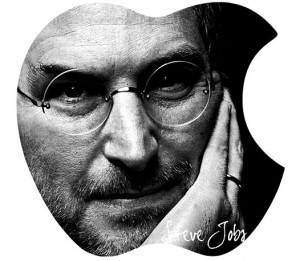Apple Inc. (NASDAQ:AAPL) is the brainchild of Steve Jobs and several other key figures from its early history, such as Jonathan Ive and Steve Wozniak. Today is Steve Jobs’ birthday, and if the maverick inventor were alive today rather than having died several years ago from pancreatic cancer, he would be 59.
Considering Mr. Jobs’ decisive role in building the company into what it is, the firm’s response to the date is surprisingly muted, consisting of no more than two tweets of already well-known Steve Jobs quotes. At the same time, filmmakers are struggling to create the definitive movie about the legendary, controversial figure.
Apple’s minimalistic approach to acknowledging Steve Jobs is probably carefully calculated and wise. Building a “cult of personality” around a company founder who is already dead would inevitably lead to unfair comparisons and the establishment of a legendary Apple (AAPL) leader whom actual flesh and blood executives could never live up to. There are already many Apple purists who claim that the company is not what it was under Mr. Jobs.
 Paying exaggerated respect to him on their site would seem to confirm that Apple’s glory days are behind them without Steve Jobs at the helm. Though Apple Inc. carries on the vigorous tradition of its founder and has continued to innovate, placing too much emphasis on Mr. Jobs would stoke the fires of Internet trolling and evoke a misplaced nostalgia that might hurt sales.
Paying exaggerated respect to him on their site would seem to confirm that Apple’s glory days are behind them without Steve Jobs at the helm. Though Apple Inc. carries on the vigorous tradition of its founder and has continued to innovate, placing too much emphasis on Mr. Jobs would stoke the fires of Internet trolling and evoke a misplaced nostalgia that might hurt sales.
Simultaneously, filmmakers continue to flounder as they try to make a definitive motion picture about the technology mogul’s life. Tackling such a subject is difficult, given the intricate complexity of the actual person’s personality, and his controversial nature in the history of electronics. Viewed variously as a powerful visionary, a tyrannical cad who ripped off the ideas of other companies, and a key but ambiguous figure, Steve Jobs is difficult to depict on film.
The 2013 movie Jobs, starring Ashton Cutcher, attempts to solve this schizophrenic spectrum of views on the tech company founder by making an inoffensively bland rendering of the Apple Inc. (AAPL) executive’s career. With a 27% “Fresh” rating on Rotten Tomatoes dot com, it fell far behind 1999’s “Pirates of Silicon Valley,” in which Steve Jobs shared the spotlight with Microsoft founder Bill Gates. “Jobs” was summed up by The Globe and Mail reviewer Liam Lacey with the succinct phrase, “If Jobs had been a producer on Jobs, he would have sent it back to the lab for a redesign.”
Battling against fate, yet another scriptwriter, Aaron Sorkin, is attempting to bring Steve Jobs to the silver screen. His script reportedly focuses on three major product releases and Mr. Jobs role in them. Though Mr. Sorkin is a superb scriptwriter, it is difficult to imagine who a film based on three product releases will appeal to. Fans of Apple and Mr. Jobs can watch the recorded unveiling of the products at any time and see the actual man in action, rather than just an actor. The rest of the viewing public seems unlikely to be entranced by the subject and pick a thriller, an action film, or a romantic comedy instead.
Apple Inc.’s (AAPL) muted salute to its founder’s birthday and Hollywood’s struggles to make a definitive Steve Jobs film highlights one fact. Apple itself is a better monument to Mr. Jobs than any website fanfare or two-hour feature film. The company bears the unmistakeable stamp of its idiosyncratic founder, in both its undoubted strengths and its undeniable peccadilloes and weaknesses. While Apple itself remains in business, any other salutation to Mr. Jobs seems superfluous.
For more Apple news follow PFhub on FaceBook, Twitter or bookmark this page.



